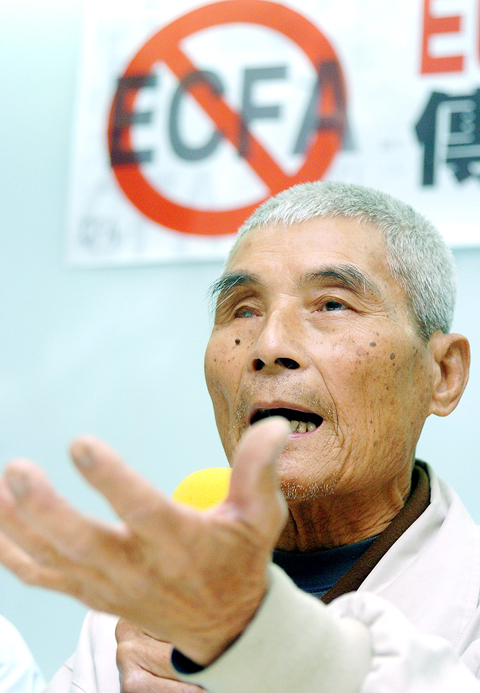Local business representatives yesterday urged the administration of President Ma Ying-jeou (馬英九) to hold a referendum on the signing of an economic pact with Beijing, saying they were against signing the planned accord under the “one China” principle.
Taiwan Friends Association president Hwang Kun-hu (黃崑虎) threatened to stage a demonstration to protest the planned economic cooperation framework agreement (ECFA) if the government turned a deaf ear to their concerns.
As Ma has expressed the hope to see results by the end of the year, Hwang yesterday urged the administration to make public and explain details of the planned accord as soon as possible.

PHOTO: CHANG CHIA-MING, TAIPEI TIMES
Hwang called on the government to allow more businesses to participate in discussions and debates over the planned accord.
The decision-making process must also be supervised by the legislature, he said.
“The government will become an autocratic one if it refuses to make public the content and let the legislature examine it,” he said.
Since Ma came into office in May, Hwang said, he has made an all-out effort to lean toward China and cooperate with Beijing to push their joint political agenda.
Hwang criticized the administration for deceiving Taiwanese, adding that the planned agreement would only make the unemployment situation worse.
Association honorary chairman and former presidential adviser Koo Kuan-min (辜寬敏) agreed, saying he fully opposed the pact because of its negative impact on employment in Taiwan.
Koo said many people worry that Taiwan’s sovereignty is being undermined after the two sides signed agreements to launch direct transportation links last year.
Some businesses could benefit from an ECFA, Koo said, but by and large it would cause more harm than good to most businesses and the public.
This is why the government must publicize the details of the economic deal, he said.
Rice farmer Huang Kun-bin (黃崑濱) urged the government to care for farmers because they fed people from all walks of life. Once the deal was signed, Huang said he was afraid local industries would go out of business because they could not compete with cheap Chinese competitors.
You Te-erh (游德二), who is in the ceramics industry, said it would make more sense to sign free-trade agreements (FTA) with other countries because 40 percent of the country’s exports already went to China. The economic pact would only lead to more economic dependence on China, he said.
If Beijing wanted to show goodwill, it should allow Taiwan to sign FTAs with other countries, he said. He also urged China to respect the country’s will regarding the name used for the economic agreement, adding that the issue must be clearly spelled out at the negotiation table.
The government must also map out a well-thought-out plan to compensate for losses in other industries resulting from the agreement, he said.
Tea farmer Chen Tsung-chien (陳聰鑑) said the government was in no position to sign any agreement with any country because so far it had failed to deal with the impact of the country’s accession to the WTO.

An essay competition jointly organized by a local writing society and a publisher affiliated with the Chinese Communist Party (CCP) might have contravened the Act Governing Relations Between the People of the Taiwan Area and the Mainland Area (臺灣地區與大陸地區人民關係條例), the Mainland Affairs Council (MAC) said on Thursday. “In this case, the partner organization is clearly an agency under the CCP’s Fujian Provincial Committee,” MAC Deputy Minister and spokesperson Liang Wen-chieh (梁文傑) said at a news briefing in Taipei. “It also involves bringing Taiwanese students to China with all-expenses-paid arrangements to attend award ceremonies and camps,” Liang said. Those two “characteristics” are typically sufficient

A magnitude 5.9 earthquake that struck about 33km off the coast of Hualien City was the "main shock" in a series of quakes in the area, with aftershocks expected over the next three days, the Central Weather Administration (CWA) said yesterday. Prior to the magnitude 5.9 quake shaking most of Taiwan at 6:53pm yesterday, six other earthquakes stronger than a magnitude of 4, starting with a magnitude 5.5 quake at 6:09pm, occurred in the area. CWA Seismological Center Director Wu Chien-fu (吳健富) confirmed that the quakes were all part of the same series and that the magnitude 5.5 temblor was

The brilliant blue waters, thick foliage and bucolic atmosphere on this seemingly idyllic archipelago deep in the Pacific Ocean belie the key role it now plays in a titanic geopolitical struggle. Palau is again on the front line as China, and the US and its allies prepare their forces in an intensifying contest for control over the Asia-Pacific region. The democratic nation of just 17,000 people hosts US-controlled airstrips and soon-to-be-completed radar installations that the US military describes as “critical” to monitoring vast swathes of water and airspace. It is also a key piece of the second island chain, a string of

The Central Weather Administration has issued a heat alert for southeastern Taiwan, warning of temperatures as high as 36°C today, while alerting some coastal areas of strong winds later in the day. Kaohsiung’s Neimen District (內門) and Pingtung County’s Neipu Township (內埔) are under an orange heat alert, which warns of temperatures as high as 36°C for three consecutive days, the CWA said, citing southwest winds. The heat would also extend to Tainan’s Nansi (楠西) and Yujing (玉井) districts, as well as Pingtung’s Gaoshu (高樹), Yanpu (鹽埔) and Majia (瑪家) townships, it said, forecasting highs of up to 36°C in those areas